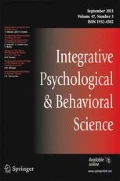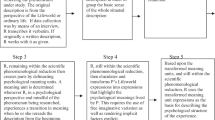Abstract
Instead of considering procrastination as a unitary construct we argue that it takes different forms and has multiple explanations and determinants. While it is fair to consider procrastination a cognitive focusing issue, we posit that the motivational sources for this vary depending on where someone can be located with regard to the “existential” developmental positions that have been explicated over many years by Object Relations clinical theorists: the autistic-contiguous, paranoid-schizoid, depressive, and transcendental. These positions generate different understandings of what motivates procrastination and in turn, effects the interventions we offer. We note both clinical and commonplace examples.
Similar content being viewed by others
Notes
Jessica Benjamins (2004) thinking about thirdness and the different stances that we take with regard to the other’s subjectivity is relevant here. Thus, the relationship between self and other can be understood along the lines of different types of relationships to the third (third in one; one in the third and so forth). Where our thinking diverges from hers is in our more explicit existential focus and in how we relate emerging subjectivity to developmental positions. In this respect, though there are of course similarities, there are also important benefits to articulating ones thinking about subjectivity, both for oneself and a community.
References
Baldwin, J. (1993/1961). Nobody knows my name. New York: Vintage books. Benjamin, J. (2004). Beyond doer and done to: An intersubjective view of Thirdness. The Psychoanalytic Quarterly, 73, 5–46.
Benjamin, J. (2004). Beyond Doer and Done To: An intersubjective view of thirdness. Psychoanalytic Quarterly, LXXIII, 5–46
Chowdhury, S. F., & Pychyl, T. A. (2018). A critique of the construct validity of active procrastination. Personality and Individual Differences, 120(7–12), 7–12.
Deci, E. L., & Ryan, R. M. (2000). The “what” and “why” of goal pursuits: Human needs and the self-determination of behavior. Psychological Inquiry, 11, 227–268.
Dewitte, S., & Schouwenburg, H. C. (2002). Procrastination, temptations, and incentives: The struggle between the present and the future in procrastinators and the punctual. Eur. J. Pers., 16, 469–489. https://doi.org/10.1002/per.461.
Glucksman, M. L. (2015). Discussion of masochism and pathological gambling: A review of masochism. Psychodynamic Psychiatry, 43(1), 27–45.
Grotstein, J. S. (2000). Relational perspectives book series; Vol. 19. Who is the dreamer who dreams the dream?: A study of psychic presences. Mahwah, NJ, US: Analytic Press.
Grotstein, J. S. (2007). The concept of the “transcendent position,” in A Beam of Intense Darkness, Wilfred Bion’s Legacy to Psychoanalysis (pp. 121–134). London: Karnac Press.
Grund, A., & Fries, S. (2018). Understanding procrastination: A motivational approach. Personality and Individual Differences, 121, 120–130.
Le Guin, U.K. (2002). Solitude. In The unreal and the real, the selected short stories of Ursula K. Le Guin, pp. 519–553. New York: Saga.
Le Guin, U.K. (2017). Solitude. In The Unreal and the Real, the Selected Short Stories of Ursula K. Le Guin, pp. 519–553. New York: Saga.
Jaffe, E (2013). Why wait? The science behind procrastination. Association for Psychological Science, accessed January 23 2018 from: https://www.psychologicalscience.org/observer/why-wait-the-science-behind-procrastination
Klein, M. (1975a). The collected works of Melanie Klein, volume I, love, guilt and reparation and other works 1921–1945. New York: The Free Press.
Klein, M. (1975b). The collected works of Melanie Klein, volume III, envy, gratitude and other works 1946–1963. New York: The Free Press.
Lachmann, F. M. (1996). How many selves make a person? Contemporary Psychoanalysis, 32, 595–614.
Liu, W., Pan, Y., Xiaoman, L., Wang, L., & Pang, W. (2017). Active procrastination and creative ideation: The mediating role of self-efficacy. Personality and Individual Differences, 119, 227–229.
Mitchell, S. A. (1997). Influence and autonomy in psychoanalysis. Hillside, NJ: Analytic Press.
O’Donohue, J. (2015). Walking in the Pasture of Wonder, Conversations with John Quinn. Dublin. Ireland: Veritas ISBN13, 9781847305251.
O'Donoghue, T., & Rabin, M. (1999). Doing it now or later. Quarterly Journal of Economics, 89(1), 103–124.
Ogden, T.H. (1986). The Matrix of the Mind, Object Relations and the Psychoanalytic Dialogue. Northvale, NJ: Jason Aronson Inc.
Ogden, T.H. (1989). The Primitive Edge of Experience. Northvale, NJ: Jason Aronson Inc.
Orange, D. (2010). Thinking for clinicians: Philosophical Resources for Contemporary Psychoanalysis and the Humanistic Psychotherapies. London and New York: Routledge, 2010.
Rebetez, M. M. L., Rochat, L., Barsics, C., & Van der Linden, M. (2016). Procrastination as a self-regulation failure: The role of inhibition, negative affect and gender. Personality and Individual Differences, 101, 435–439.
Reich, A. (1960). Pathologic forms of self-esteem regulation. Psychoanalytic Study of the Child, 24, 213–226.
Sartre, J-P. (1992). Being and nothingness. New York: Washington Square Press. [Originally published 1943].
Steele, P. (2007). The nature of procrastination: A meta-analytic and theoretical review of quintessential self-regulatory failure. Psychological Bulletin, 133(1), 65–94.
Stern, D. B. (2015). Relational freedom: Emergent properties of the interpersonal fields (psychoanalysis in a new key book series). New York, NY: Routledge Publications.
Swanson, A (2016, April 27). The reasons why you procrastinate – and how to stop. Washington Post. Retrieved January 23, 2018 from https://www.washingtonpost.com/news/wonk/wp/2016/04/27/why-you-cant-help-read-this-article-about-procrastination-instead-of-doing-your-job/?utm_term=.f12414634982
Swofford, A. (2003). Jarhead, a Marine’s Chronicle of the Gulf war and other battles. New York: Scribner.
Valsiner, J. (2007). Culture in minds and societies: Foundations of cultural psychology. New York, NY: Sage Publications.
Webb, R. & Rosenbaum, P.J. (2018). Resilience and thinking perpendicularly: A meditation or morning jog. Journal of College Student Psychotherapy, https://doi.org/10.1080/87568225.2018.1449687.
Werner, H., & Kaplan, B. (1963). Symbol formation: An organismic developmental approach to language and the expression of thought. New York, NY: John Wiley.
Widseth, J. C. (1987). Hearing the theme of archaic grandiosity in procrastination by college students. Journal of College Student Psychotherapy, 1(3), 91–98.
Winnicott, D. W. (1935). The manic defence. In Through pediatrics to psycho-analysis (pp. 262–277). New York: Basic Books.
Winnicott, D. W. (1954). The depressive position in normal development. In Through pediatrics to psycho-analysis (pp. 262–277). New York: Basic Books.
Author information
Authors and Affiliations
Additional information
Publisher’s Note
Springer Nature remains neutral with regard to jurisdictional claims in published maps and institutional affiliations.
Rights and permissions
About this article
Cite this article
Webb, R.E., Rosenbaum, P.J. The Varieties of Procrastination: with Different Existential Positions Different Reasons for it. Integr. psych. behav. 53, 525–540 (2019). https://doi.org/10.1007/s12124-018-9467-1
Published:
Issue Date:
DOI: https://doi.org/10.1007/s12124-018-9467-1



